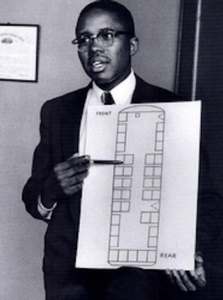
Fred Gray testifying
*On this date in 1956, Fred Gray filed the case of Browder v. Gayle in U.S. District Court. (Browder was a Montgomery housewife; Gayle, the mayor of Montgomery).
It was Browder v. Gayle that caused segregation on public buses to be eradicated. Immediately after the start of the Montgomery Bus Boycott, Black leaders began a discourse on the need for a federal lawsuit to challenge city and state bus segregation laws. About two months after the bus boycott began, Claudette Colvin's case was re-considered by black legal leaders.
Attorneys Fred Gray, E.D. Nixon, and Clifford Durr (a white lawyer who, with his wife, Virginia, was an activist in the civil rights movement) searched for the ideal case law to challenge the constitutional legitimacy of city and state bus segregation laws. Parks’ case was not used as the basis for the federal lawsuit because, as a criminal case, it would have to make its way through the state criminal appeals process before a federal appeal could be filed. City and state officials could have delayed a final rendering for years. In addition, attorney Durr believed it was possible that the outcome would merely have been that the conviction of Parks would be vacated with no changes in segregation laws.
Gray researched for the lawsuit, consulting with NAACP legal counsels Robert Carter and Thurgood Marshall (who would later become U.S. solicitor general and a U.S. Supreme Court justice). Gray approached Aurelia Browder, Susie McDonald, Claudette Colvin, and Mary Louise Smith, all women mistreated by the Montgomery bus system the previous year. They all agreed to become plaintiffs in a civil action lawsuit. On June 5, 1956, the Alabama Supreme Court ruled on Browder v. Gayle. This case was one of many legal turning points in the American Civil Rights movement.
On June 19, 1956, the U.S. District Court three-judge panel ruled that Section 301 (31a, 31b, and 31c) of Title 48, Code of Alabama, 1940, as amended, and Sections 10 and 11 of Chapter 6 of the Code of the City of Montgomery, 1952 "deny and deprive plaintiffs and other Negro citizens similarly situated of the equal protection of the laws and due process of law secured by the Fourteenth Amendment," (Browder v. Gayle, 1956). The court essentially decided that the Brown v. Board of Education (1954) precedent could be applied to Browder v. Gayle.
On November 13, 1956, in Browder v. Gayle, the United States Supreme Court outlawed racial segregation on buses, deeming it unconstitutional. The court order arrived in Montgomery, Alabama, on December 20, 1956. The bus boycott ended on December 21, 1956. However, more violence erupted following the court order, as snipers fired into buses and Dr. King's home and bombs were thrown into churches and the homes of many church ministers.
King Encyclopedia.Stanford.edu
Historic U.S. Cases 1690-1993:
An Encyclopedia New York
Copyright 1992 Garland Publishing, New York
ISBN 0-8240-4430-4